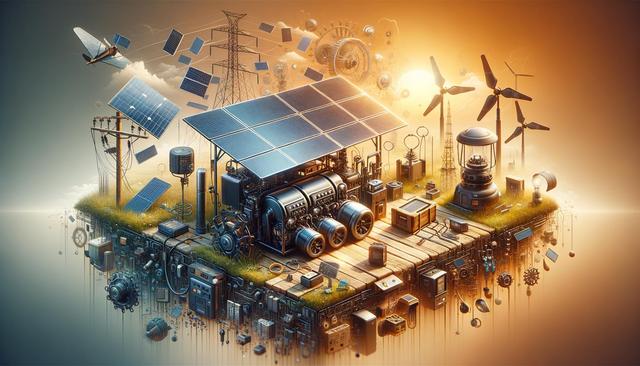What is a Solar Generator?
A solar generator is a portable power station that uses solar panels to capture energy from the sun and store it in a battery for later use. Unlike traditional gas-powered generators, solar generators are clean, quiet, and require no fuel other than sunlight. At their core, they typically consist of three main components: solar panels, a charge controller, and a battery with an inverter. These elements work together to collect, regulate, store, and convert solar energy into usable electricity for various devices and appliances.
Solar generators are ideal for both emergency backup power and off-grid applications. They are used in homes to maintain basic energy needs during power outages, in RVs and boats for on-the-go electricity, and even in outdoor camping scenarios. Their portability and ease of use make them accessible to a broad range of users looking for sustainable energy solutions without complex installation or maintenance.
Key Features to Look For
When choosing a solar generator, it’s essential to consider several features that can significantly affect performance and suitability for your needs. These include:
- Battery Capacity: Measured in watt-hours (Wh), this determines how much electricity the generator can store and provide.
- Power Output: Look for both the continuous and peak wattage to understand what devices it can handle.
- Charging Options: Many units offer multiple ways to recharge, including solar, wall outlet, and car port.
- Portability: Weight and size matter, especially if you’ll be moving the generator frequently.
- Build Quality: Durable construction and weather-resistant materials are important for outdoor use.
Some models also offer advanced features such as app integration, expandable battery modules, or fast-charging capabilities. While these extras can add to the cost, they may provide added convenience and flexibility depending on your usage patterns.
Benefits of Using Solar Generators
Solar generators offer a wide array of benefits that make them a desirable alternative to traditional energy sources. Among the most notable advantages:
- Eco-Friendly: They produce no emissions, making them an environmentally responsible choice.
- Quiet Operation: Without engines or exhaust systems, they operate silently, which is ideal for both home and outdoor settings.
- Low Maintenance: With fewer moving parts and no fuel to manage, upkeep is minimal.
- Cost-Effective Over Time: Although the initial investment can be higher, solar energy is free, and the long-term savings can be significant.
Furthermore, solar generators are incredibly versatile. They can power small electronics like smartphones and laptops, or larger appliances such as refrigerators and power tools, depending on their capacity. This makes them suitable for a wide range of users, from weekend campers to homeowners preparing for emergencies.
Common Use Cases
Understanding how and where solar generators are commonly used can help you determine if they’re the right fit for your needs. Some of the most common applications include:
- Emergency Backup: During power outages due to storms or grid failures, solar generators can keep essential devices running.
- Outdoor Recreation: Campers, hikers, and RV travelers use them for lighting, cooking, and charging devices off-grid.
- Remote Work Sites: Ideal for powering tools and equipment where access to the electrical grid is limited.
- Everyday Home Use: Some users incorporate solar generators into their daily energy strategy to reduce electricity bills and reliance on the grid.
They are particularly valued in regions prone to natural disasters or where utility services are unreliable. Their capacity to provide dependable power without the need for fuel storage or refueling makes them a safer and more convenient option in such environments.
Tips for Efficient Use and Maintenance
To get the most out of your solar generator, proper usage and routine maintenance are essential. Here are some practical tips to help ensure long-term performance:
- Position Solar Panels Wisely: Maximize exposure to direct sunlight and avoid shading for optimal charging efficiency.
- Keep Components Clean: Dust and debris can reduce efficiency, so regularly clean your solar panels and ventilation areas.
- Monitor Battery Levels: Avoid completely draining the battery, as this can shorten its lifespan. Use the generator’s monitoring features to stay informed.
- Store Properly: When not in use, store the unit in a cool, dry place and keep the battery partially charged.
- Regular Testing: Periodically test your generator to ensure it’s ready when you need it, especially if it’s intended for backup power.
Following these simple steps will help extend the life of your solar generator and ensure it remains a reliable power source. Additionally, reading the user manual specific to your model can provide insights into care routines and optimal usage patterns.






